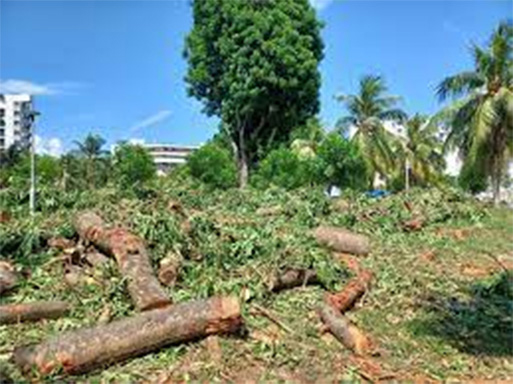
Published :
Updated :

One may recall the fury of the forest grabbers when they attacked government officials including members of the joint-forces in November last year as the latter carried out an eviction drive at Rajbari in Sreepur upazila of Gazipur to recover forestland. During the attack, 10 people including an assistant commissioner (land) were injured and vehicles belonging to the Sreepur upazila UNO and excavators were vandalized. It appears, government-owned lands including forests are up for grabs, while government people, let alone responsible members of the public who might dare challenge it, would be considered as intruders by the grabbers.
But then one is left wondering when Forest Department (FD) itself allows pineapple, banana and papaya to grow on large tracts of forestland once occupied by sal bon (sal forest) of Madhupur in Tangail and where rubber plantation covers over 7,500 acres of land courtesy of FD who leased out that land to the Bangladesh Forest Industry Development (BFIDC). In that case, you cannot perhaps blame ordinary people doing something similar. For people follow examples. Consider the case of Md. Azmir Hossain (37). He lives in the Beltali area of Cumilla Sadar South, close to the Dhaka-Chattogram highway. He, allegedly, cut down some 52 bokul trees (Spanish cherry, bullet wood; scientific name: Mimusops elengi) from the median of the Dhaka-Chattogram highway because to him those trees were of no use and they looked like trash.
So, after felling and burning down some 52 bokul trees along a 500-metre stretch of the highway divider, Azmir planted some fruit-bearing trees and vegetables. To him there was nothing wrong in what he did. But one wonders, how growing up as a native of this country, the person in question has no knowledge of a bokul tree or its cream-coloured, intensely fragrant flowers that he dismissed as garbage! Let us for the moment forget that bokul is unfamiliar to Azmir, who lives close to the Dhaka-Chattogram highway in a tin-shed hut, which is adjacent to the main gate of the yet-to-be-inaugurated 100-bed child hospital and where he sells tea and snack foods. So, there is no doubt that the man has real business acumen to have chosen the spot to make a living by running a teashop.
Obviously, a sufficiently worldly-wise person, Azmir could not have failed to know that the strip of land on the Dhaka-Chattogram highway was owned by the RHD. So, by cutting down trees standing on government land or using the land for growing vegetables or other kinds of plants, he was knowingly breaking the law. However, he might be unaware of the fact that the bokul trees were planted to beautify the surroundings of the divider between the lanes of the highway. Also, it might be unbeknown to him that in 2016, when the four-lane Dhaka-Chattogram highway became operational, the bokul trees were planted on the highway median so that after growing tall they might block headlights of the vehicles on one lane from dazzling the eyes of vehicle drivers on the opposite lane. But at a time, when even a schoolchild knows that cutting of trees is damaging to environment, it could not be otherwise for a grown-up person like Azmir.
Clearly, Azmir was consciously breaking the law, for he has seen many others are also flouting law with impunity through grabbing government lands or felling trees on such lands. So, he just took a chance. In case, it goes unnoticed by RHD authorities or the law-enforcers, his vegetable farming along with the earning from teashop would be a rewarding enterprise for him. Or maybe, he has connections to fall back on in case any emergency arises. However, Md.Azmir Hossain is not that lucky to get away with his illegal act. He has reportedly been arrested and is now and taken into police custody. Will the government be equally prompt to hold other illegal occupants of public land?
sfalim.ds@gmail.com


 For all latest news, follow The Financial Express Google News channel.
For all latest news, follow The Financial Express Google News channel.